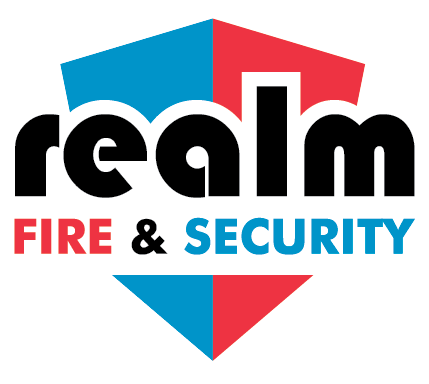
To provide additional flexibility for our customers, Realm Fire & Security Ltd is able to offer the latest wired fire alarm systems, wireless fire alarm systems, or an amalgamation of both, depending on requirements.
Wired systems
In fully wired systems, each individual component in the system is hard-wired back to the control panel using fire-resistant cabling, meaning that each component communicates with the system through a physical connection. This can provide a reliability advantage over a wireless system, where range, and ‘line of sight’ can become issues. Indeed, for buildings whose construction may inhibit wireless communication, (for example, in buildings made of metal), wired fire alarms may still be the only viable option.
Disadvantages of wired systems
The main disadvantage of wired systems is the cost. In large buildings, where cable runs are long, and particularly where cables need to be hidden for aesthetic reasons, installation costs can be prohibitively expensive. In historical buildings, where the drilling of holes may not be permitted, wired systems are impractical. In these circumstances, Realm Fire & Security Ltd may recommend a wireless fire alarm system to overcome these problems.
Wireless systems
Realm Fire & Security Ltd’s wireless fire alarm systems use the latest radio technology to provide wireless communication back to the fire panel from each individual component. Before recommending a wireless system Realm Fire & Security Ltd will arrange for a radio survey to be carried out to ensure that a wireless system can be installed that is as reliable as our wired systems. Wireless systems have certain advantages over wired systems, and can be used effectively as follows:
- To reduce costs
Because there is no need to run cables, wireless systems carry much lower installation costs than their wired counterparts. This is more than enough to offset any additional equipment costs and allows Realm Fire & Security Ltd to provide excellent value for money. - To minimise disruption
Because individual components do not need to be hardwired, most of the configuration can be done off-site. This minimises disruption at the client premises. In settings such as residential or care homes, this reduces the inconvenience to the residents. - In historical or listed buildings
Wireless systems can be installed without damaging the structure of the building. - In temporary structures, or for temporary events
Because wireless fire alarms can be installed largely ‘out of the box’ they can provide practical solutions where a fire alarm is only needed for a limited amount of time. They can simply be dismantled again once they are no longer needed.
Disadvantages of wireless systems
Because wireless components are not physically connected to fire panels, each needs its own battery power source. This can increase maintenance costs over the longer term.
Hybrid Systems
As the name would suggest, hybrid systems contain both wired and wireless components. Wired components can be used to bridge any gaps in wireless transmission identified by the radio survey, without prohibitively increasing the cost of the overall system. Hybrid systems can also be used to connect two wired systems together into one integrated system, or to add additional outbuildings to the main building’s alarm system without the need to run cables across roads/car parks, etc.
If you have any questions about which system is right for you, please contact us on 01224 710014. Realm Fire & Security’s Specification Engineer will be happy to tailor a system to your individual requirements.


